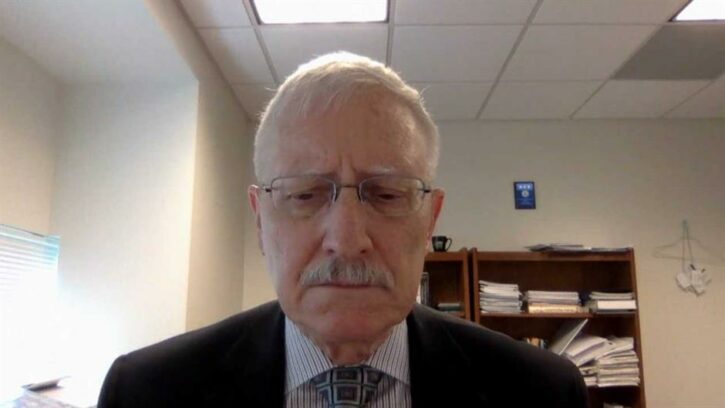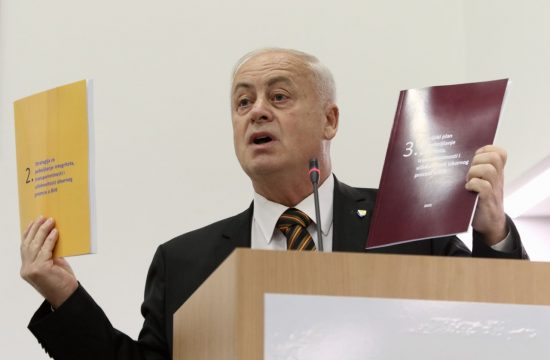
The departure of current US Ambassador in Sarajevo, Maureen Cormack, and the arrival of the new ambassador, Eric Nelson, does not mean a significant change in the US policy towards Bosnia, said Richard Kauzlarich, US diplomat and former ambassador to Bosnia and Herzegovina, in an exclusive interview for N1.
“I know Ambassador Cormack better than I do the prospective ambassador. She has done just an outstanding job as ambassador in Sarajevo, under very difficult circumstances,” said Kauzlarich.
According to him, the US has a tradition of sending “the very best to Sarajevo” and Nelson will be one of them.
“I am sorry Maureen is leaving but I think, in terms of continuity of our level of engagement with Bosnia and Herzegovina, you will be well-served as well as the United States,” he said.
The former US representative in Sarajevo dismissed the theories about changes in the US policy towards Bosnia and Herzegovina and its Serb-dominated entity, the Republika Srpska (RS).
“I don’t think that’s the case. This is natural. Ambassador Cormack has been there now for almost three years and that’s a long time. (…) The fact is we have an experienced ambassador being replaced by an experienced ambassador. So the shift itself is not an indication of any change in the policy between the previous administration and the Trump administration,” Kauzlarich noted.
Commenting the recent talks on border re-arrangements in the Balkans, the former ambassador said he had hoped this matter was closed back during his service in Bosnia.
“I know from my own time when people start getting out pieces of paper and redrawing maps that bad things happen. I don’t know enough about what Serbia and Kosovo have exactly in mind, but new maps don’t solve the fundamental problems that still exist between Kosovo and Serbia,” Kauzlarich said, adding, “I am concerned, I don’t know what people in Sarajevo and Bosnia and Herzegovina are talking about when they look at the publicity that surrounded the Kosovo and Serbia discussion, but personally I just don’t see this is solving any problems.”
According to him, there are other issues to be “very concerned about first” and only then “we can look at whether it makes any sense even to talk about redrawing the map.”
Speaking of the recent death of the prominent Republican senator, John McCain, and his relations with Bosnia and Herzegovina, Kauzlarich said the senator was someone who was seriously engaged in what was going on in the Western Balkans, especially Bosnia and Herzegovina.
“One of the things during his trip (to Bosnia and Herzegovina) in 2017 he was concerned about was Russian influence,” reminded Kauzlarich adding that he shares the same concern.
“Not as if it’s anything new but it seems it’s all over the various countries in the region, starting in Serbia where, in my view, the facility that exists in Nis is almost a military base for Russia. You have the Russian involvement in the attempted coup in Montenegro, their involvement in Greece, and trying to influence the discussion over the Macedonian name issue,” said Kauzlarich adding that Russia is using energy as a “soft power” to gain the influence throughout the Western Balkans.
“I think it’s a real danger for everything that we worked so hard together with the people of Bosnia and Herzegovina and Kosovo to build out of the horrible wartime situation that we had in the early 1990s. This is not a good thing because the emphasis that Russia is putting on this region is based on division rather than supporting,” Kauzlarich warned and expressed hope the current US Administration and the State Department will continue to be engaged and make sure that “the Russian involvement does not lead to further division.”
As for the UK’s current engagement in the Balkans, the former ambassador said it did not surprise him, and that back during his term in Sarajevo the UK was “our strongest partner” in trying to implement the peace agreement and block those trying to undermine peace and security in Bosnia.
He pointed out Germany’s engagement in the region, saying that Germany is playing “a much more active role.”
“The European Union is going to be there, whatever one thinks about the future of the EU it’s still an important element in both political terms but also economic terms in the countries here. Putting Kosovo, Serbia, and Bosnia and Herzegovina on the road towards eventual EU membership, I think it is still a reasonable and acceptable way forward,” he said expressing hope the US will take advantage of Germany’s and the UK’s engagement “to look for the new ways to be helpful.”
In his opinion, the situation in Kosovo is currently a burning issue but that there is also a lot of work that still that needs to be done in Bosnia and Herzegovina.
“Unfortunately, the efforts of some political leaders in Bosnia and Herzegovina are moving in the wrong direction. We’re talking about the future of the country in the EU,” Kauzlarich concluded.
He finds the elections important and hopes the citizens of Bosnia and Herzegovina will elect a new generation of political leadership, “people who may have a better sense of the future as opposed to the continuously reliving the past.”
“I am just not optimistic that the kinds of the political leaders who have been selected in the past have taken the right kinds of decisions for the future of the country,” he said.
Kauzlarich served in Bosnia and Herzegovina in the 1997-1999 period and is currently teaching as a Visiting Professor at the Schar School of Policy and Government at George Mason University.




